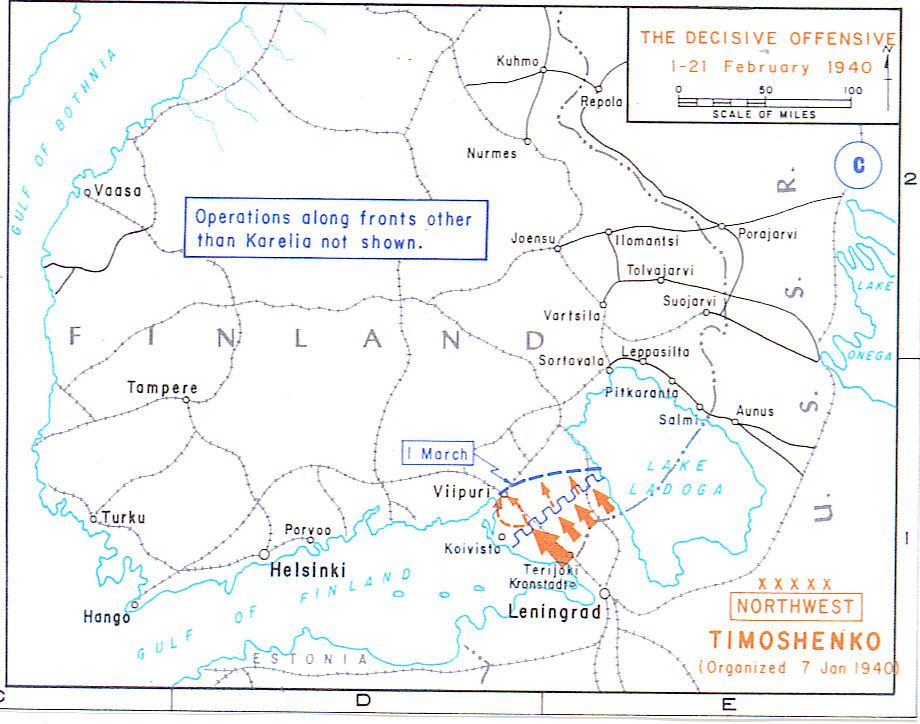
Posted on 02/06/2010 5:06:15 AM PST by Homer_J_Simpson













By 7.30 in the evening the Finnish front line is entirely under Finnish control. The retreating enemy suffers heavy losses from the Finnish artillery and machine-gun fire.
Photo: SA-KUVA
Mannerheim Line holds firm on the Isthmus
Justice Frank Murphy, former governor of the Philippines, will be the main dissenting Justice in “In Re Yamashita,” the appeal of Japanese General Tomoyuki Yamashita from his sentence of death imposed by a military tribunal.
Yamashita led the Japanese defense of the Philippines, and during that defense there were a number of atrocities committed against the Filipino people (most of which were not done under Yamashita’s direction). Regardless of the merits of the case, (which I will discuss 6 years hence if we’re still doing this), it’s interesting that the former governor of the Philippines will be the staunchest judicial defender of Yamashita.
http://www.onwar.com/chrono/1940/feb40/f06feb40.htm
In Britain... At Euston Station, in London, a parcel bomb injures 4 people. Members of the IRA are reported to be responsible.
From London... The government produces a white paper on the Asamu Maru incident (January 21st). Also, pressure from the admiralty leads to new guidelines for BBC war reporting being agreed upon at Broadcasting House. From now on, the sinking of a small ship may be mentioned only once in a BBC news bulletin. Larger ships, like the Canadian Pacific freighter Beaverburn, sunk today, can be mentioned in consecutive bulletins. There is concern that the rising effectiveness of German U-boats, combined with zealous reporting, will give the impression that British losses are even greater than they are. Meanwhile, a nationwide campaign is launched to end war gossip, under the slogan “Careless Talk Costs Lives.”
http://homepage.ntlworld.com/andrew.etherington/month/thismonth/06.htm
February 6th, 1940
UNITED KINGDOM:
London: An IRA bomb explodes at Euston station injuring four people.
Westminster: Pressure from the admiralty led to new guidelines for BBC war reporting being agreed at Broadcasting House today. From now on the sinking of a small ship may be mentioned only once on a BBC news bulletin. Sinkings of larger ships, like the Canadian Pacific freighter ‘Beaverburn’, sunk today, may still be mentioned in consecutive bulletins. The government is worried by the rising effectiveness of German U-boats, and fears that zealous reporting by the BBC will give the impression that British losses are even greater than they are.
A nationwide campaign to stamp out war gossip has been launched under the slogan “Careless Talk Costs Lives.” The Ministry of Information is distributing 2.5 million posters to offices, hotels, shops, banks and public houses about the dangers of giving information to enemy sympathisers.
‘Punch’ cartoonist “Fougasse” (Kenneth Bird) has been drafted into put humour into the message with a series of cartoons showing Hitler eavesdropping from train luggage racks, telephone kiosks or concealed in framed portraits on the walls. Artist Norman Wilkinson has painted a torpedoed ship sinking with the reminder “A few careless words may end in this” and a seductive siren listening in at an officers club with the caption “Keep mum, she’s not so dumb.” The posters are snappier than an earlier MoI effort which read: “Do not discuss anything which might be of national importance. The consequence of any such indiscretion may be the loss of many lives.”
Women who turned out of their beds at dawn yesterday to help drag a north-east coast lifeboat a mile across land before it could be launched showed the determination and energy which there is to be tapped by war industries.
Talks between Ernest Brown, the Minister of Labour and National Service, and the National Executive of the Amalgamated Engineering Union began yesterday to work out ways of speeding up the supply of women workers to the ammunition factories. Pressure is also growing for equal pay to be given to new recruits.
The government produces a white paper on the SS Asamu Maru incident where the British light cruiser HMS Liverpool stopped the passenger liner on 21 January 35 miles (56 kilometres) off the Japanese coast and removed 21 German citizens from the ship. (Jack McKillop)
SS Anu struck a mine laid on 12 Dec 1939 by U-13 in the entrance to River Tay and sank.
The Government issues new regulations regarding the start of Summer Time. The original Summer Time order stated that the clock would be advanced from 0200 hours Greenwich Mean Time on the day following the third Saturday in April, i.e., 21 April 1940. The new order changes the start date of Summer Time to the day after the fourth Saturday in February, i.e., 24 February 1940. (Jack McKillop)
Destroyer HMS Pakenham laid down.
Tug HMS Alligator commissioned. (Dave Shirlaw)
NORWAY: German freighter SS Konsul Horn, which had departed Aruba, Netherlands West Indies, on 7 January, reaches Norwegian waters having eluded or deceived the U.S. Neutrality Patrol as well as British and French warships. (Jack McKillop)
U.S.A.: The Radio Corporation of America (RCA), the owner of the National Broadcasting Company (NBC), demonstrates an electronic color television system to the US Federal Communications Commission (FCC) but the results are poor and a public demonstration is cancelled. (Jack McKillop)
Disclaimer: Opinions posted on Free Republic are those of the individual posters and do not necessarily represent the opinion of Free Republic or its management. All materials posted herein are protected by copyright law and the exemption for fair use of copyrighted works.